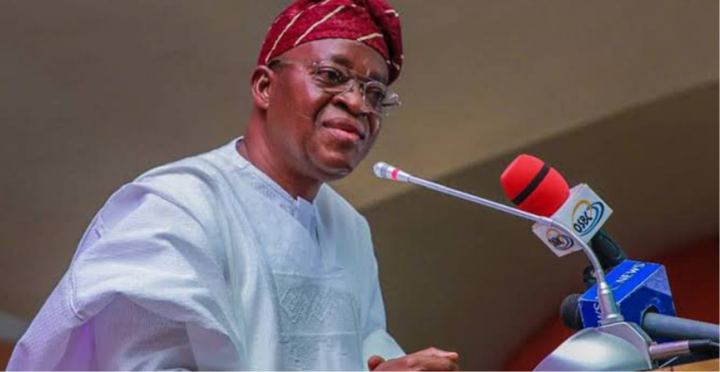Minister of Marine and Blue Economy, Adegboyega Oyetola, has announced an ambitious plan to significantly reduce Nigeria’s dependence on fish imports by expanding local aquaculture production and empowering young people to actively participate in the fisheries value chain. He said the strategy is aimed at strengthening food security, creating jobs, and preserving foreign exchange currently spent on importing fish.
Speaking at a stakeholders’ engagement in Abuja, Oyetola lamented that Nigeria still imports a substantial portion of its fish consumption despite having abundant marine resources and inland waterways. According to him, the country spends billions of naira annually on fish imports, a practice he described as unsustainable and counterproductive to national development.

The minister stressed that the solution lies in a deliberate push for local fish farming, efficient harvesting of marine resources, and robust value addition processes that can compete with imported products in quality and price. He said the ministry is working with relevant agencies, research institutions, and private investors to develop the sector’s infrastructure and supply chains.
Part of the plan, Oyetola explained, is to empower thousands of young Nigerians with technical training, starter packs, and access to financing so they can establish small and medium-scale fish farms. He noted that youth participation is critical, not only to reduce unemployment but also to ensure generational continuity in the fishing and aquaculture industry.
“We cannot continue to depend on other countries for what we can produce ourselves. Fish is an essential source of protein for our people, and we have all it takes to produce enough for our population and even for export,” Oyetola said. “By engaging our youths and giving them the right tools, we are creating a sustainable pathway for self-reliance in fish production.”
Oyetola also highlighted the economic opportunities within the fisheries value chain, which include fish breeding, feed production, processing, packaging, storage, and distribution. He said the ministry is focused on improving cold storage facilities, modernising fish markets, and facilitating access to domestic and export markets for locally farmed fish.
Industry experts say the minister’s initiative aligns with Nigeria’s broader food security goals and the need to diversify the economy away from oil dependence. They point out that local fish farming has the potential to meet domestic demand, reduce pressure on foreign reserves, and open new export opportunities to regional and international markets.
Nigeria’s current fish production capacity is estimated at about 1.2 million metric tonnes annually, while national consumption is around 3.6 million metric tonnes. This creates a deficit of over two million metric tonnes, which is largely met through imports. Oyetola said closing this gap would require a coordinated approach involving federal and state governments, private investors, and development partners.
The minister further disclosed that the government is reviewing policies to incentivise investment in aquaculture, including tax reliefs for fish farmers, concessional loans, and grants for technology adoption. He said such policies would help local producers expand operations and enhance productivity.
Oyetola noted that the empowerment programme for youth will be implemented in phases across the six geopolitical zones, with priority given to coastal states and areas with high potential for aquaculture. Beneficiaries will undergo practical training in hatchery management, pond construction, feed formulation, disease control, and business management.
He added that the programme would also focus on women, given their significant role in fish processing and marketing. By providing targeted support to women entrepreneurs in the fisheries sector, the government hopes to strengthen household incomes and boost rural economies.
Stakeholders at the meeting expressed optimism about the plan but urged the government to ensure transparency in beneficiary selection and timely disbursement of support packages. They also called for improved monitoring to track progress and prevent diversion of resources.
The minister assured that a robust monitoring framework is being put in place to ensure accountability. He said the programme’s impact will be evaluated regularly, and adjustments will be made to address emerging challenges.
Oyetola also emphasised the importance of research and innovation in driving the sector forward. He pledged government support for universities and research institutions engaged in aquaculture studies, including the development of disease-resistant fish species, sustainable feed alternatives, and environmentally friendly farming methods.
As part of the broader marine economy strategy, the minister said efforts are ongoing to tackle illegal, unreported, and unregulated fishing in Nigeria’s waters. He noted that illegal fishing depletes fish stocks, undermines local fishermen’s livelihoods, and results in revenue losses for the government.
In his closing remarks, Oyetola urged Nigerians to embrace locally produced fish, stressing that consumer preference for imported brands can only change if there is adequate awareness of the quality and nutritional value of local varieties. He said government campaigns will soon be launched to promote the consumption of Nigerian fish.
He reaffirmed the ministry’s commitment to building a thriving marine and aquaculture sector that not only meets domestic needs but also positions Nigeria as a key player in the global seafood market.
By focusing on youth empowerment, capacity building, and infrastructure development, Oyetola believes the country can reverse its fish import trend within a few years. He expressed confidence that with collective effort and sustained investment, Nigeria could become self-sufficient in fish production and even emerge as an exporter to neighbouring countries.
Support InfoStride News' Credible Journalism: Only credible journalism can guarantee a fair, accountable and transparent society, including democracy and government. It involves a lot of efforts and money. We need your support. Click here to Donate
